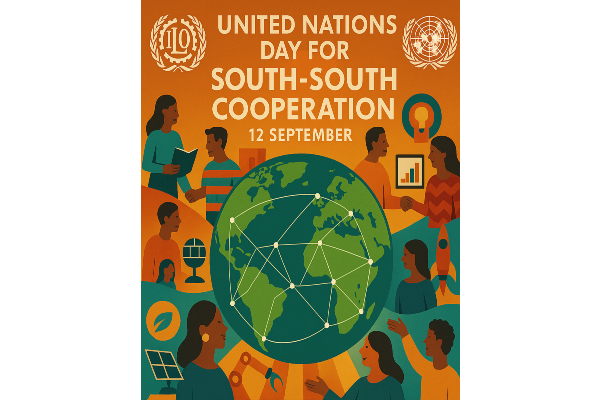
The United Nations marks 12 September as the United Nations Day for South–South Cooperation, celebrating the achievements of developing countries working together—and with partners worldwide—to advance the 2030 Agenda for Sustainable Development. The South-South Day, of course, concerns the South, East, North and West, and through triangular cooperation, South-South also engages with funding partners from the North. The United Nations Day for South–South Cooperation is celebrated every year on 12 September to commemorate the 1978 adoption of the Buenos Aires Plan of Action for Promoting and Implementing Technical Cooperation among Developing Countries (BAPA). It highlights the importance of South–South and triangular cooperation in achieving internationally agreed development goals.
Observed each year on 12 September, the Day commemorates the adoption of the Buenos Aires Plan of Action (BAPA) in 1978 and underscores the value of solidarity, mutual learning, and innovation across the Global South. In 2009 (BAPA +40), a High-Level UN Conference reaffirmed the values of solidarity, mutual learning, and innovation.
2025: A Year of Breakthrough Achievements
Throughout 2025, countries of the Global South, in partnership with UN agencies and triangular partners, have demonstrated how South–South and triangular cooperation can deliver concrete results for people, economies, and the planet. Key highlights include:
- High-level Committee on South–South Cooperation (New York, May 2025): The 22nd session brought together over 70 delegations under the theme “South–South Cooperation as a Driver for Transformation.” Leaders emphasized the power of science, technology, and innovation—including artificial intelligence—for advancing inclusive development. ILO held a special high-level event dedicated to the achievements of Indonesia, Brazil, UNOSSC and NYU on Artificial Intelligence and SSTC.
- Brazil–ILO Annual South-South Review (Geneva, June 2025): Brazil and the International Labour Organization reaffirmed their partnership for social justice through the South–South cycle “Social Justice for the Global South” (2023–2027). With more than US$44 million invested since 2005, Brazil has supported projects in nearly 40 countries, promoting social protection, equality, and the elimination of child labour.
- BRICS+ and Artificial Intelligence and Just transitions for decent work (Brasilia, April 2025): Ministers, experts, and partners launched the BRICS Knowledge Platform on AI and the World of Work, alongside the ILO’s new AI Observatory, charting pathways for inclusive digital transitions and rural employment, with a reaffirmation of South-South cooperation, social justice and fundamental principles and rights at work. During the BRICS labour ministers’ meeting in Brasilia, ILO Director General, Gilbert Houngbo recalled that he congratulated the Brazilian Presidency “for placing the Global South at the Heart of the Agenda”
- Support of Indonesia and Kuwait to Palestine: the countries of the Global South also rallied around the 2024 pledge to support rehabilitation and reconstruction efforts in OPT through renewed social justice and social protection.
- Solidarity Economy in Mozambique (Maputo/Geneva, May 2025): An international seminar in Mozambique highlighted the transformative role of the social and solidarity economy (SSE) in advancing decent work and reducing inequalities. The SSE Academy, active since 2010, was reaffirmed as a global platform for South–South learning.
- Regional Partnerships: From the World Forum on Local Economic Development in Seville to the EIIP Interregional Forum in Bangladesh, South–South and triangular cooperation facilitated peer learning across Latin America, Africa, Asia, and the Arab States.
- South4Care Platform Lauch: Mandated by the International Labour Conference, a gender-sensitive care economy platform is being launched during South-South Day and in the following week in Doha.
- ASEAN Employment Cooperation (January 2025): The ProSSCE–ASEAN project, supported by China, reported reaching over 114,000 direct beneficiaries, serving as a flagship example of SSTC in employment creation.
- Triangular Cooperation: Dutch-funded projects such as PROSPECTS and ACCEL have also supported South-South cooperation in East and West Africa and sharing good practices in combatting child labour, forced labour, and supporting the rights of migrant workers.
Marking the Day, UN leaders emphasized that South–South and triangular cooperation are no longer “optional” but essential instruments for accelerating sustainable development and social justice in the face of global crises. As the world moves closer to 2030, South–South cooperation will continue to grow as a cornerstone of the United Nations system, building resilience, innovation, and equality across the Global South.
For more information:
Visit www.southsouthpoint.net and www.unsouthsouth.org.

